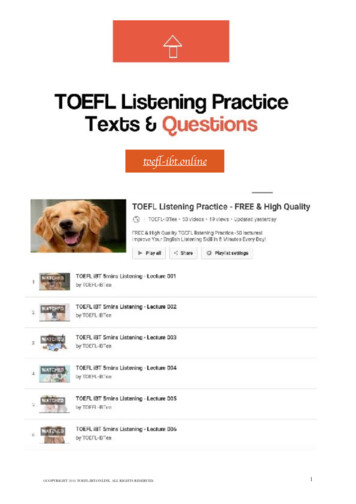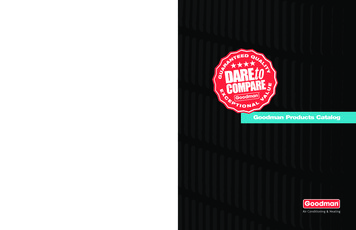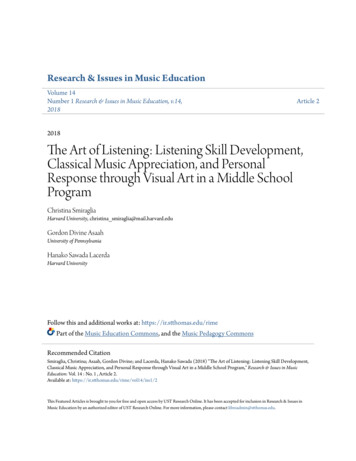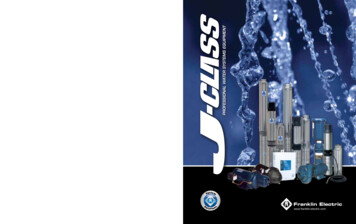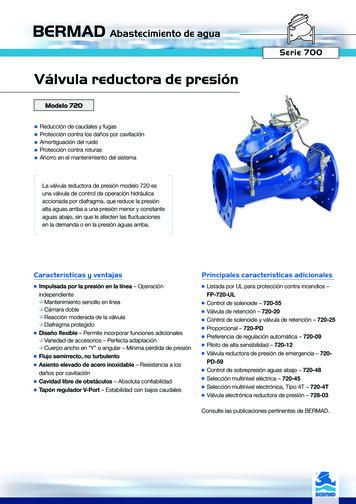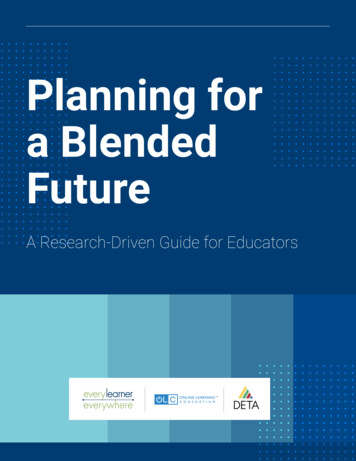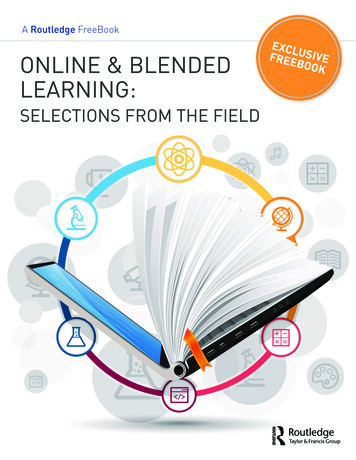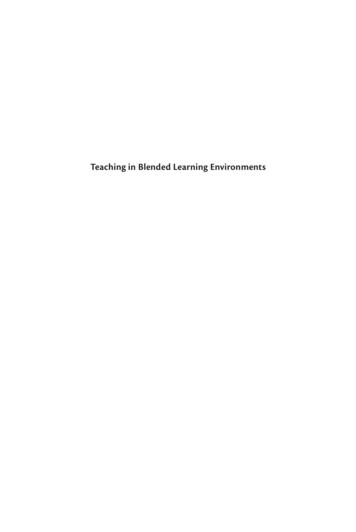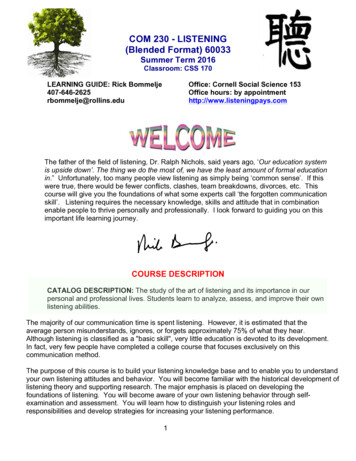
Transcription
COM 230 - LISTENING(Blended Format) 60033Summer Term 2016Classroom: CSS 170LEARNING GUIDE: Rick Bommelje407-646-2625rbommelje@rollins.eduOffice: Cornell Social Science 153Office hours: by appointmenthttp://www.listeningpays.comThe father of the field of listening, Dr. Ralph Nichols, said years ago, ‘Our education systemis upside down’. The thing we do the most of, we have the least amount of formal educationin.” Unfortunately, too many people view listening as simply being ‘common sense’. If thiswere true, there would be fewer conflicts, clashes, team breakdowns, divorces, etc. Thiscourse will give you the foundations of what some experts call ‘the forgotten communicationskill’. Listening requires the necessary knowledge, skills and attitude that in combinationenable people to thrive personally and professionally. I look forward to guiding you on thisimportant life learning journey.COURSE DESCRIPTIONCATALOG DESCRIPTION: The study of the art of listening and its importance in ourpersonal and professional lives. Students learn to analyze, assess, and improve their ownlistening abilities.The majority of our communication time is spent listening. However, it is estimated that theaverage person misunderstands, ignores, or forgets approximately 75% of what they hear.Although listening is classified as a "basic skill", very little education is devoted to its development.In fact, very few people have completed a college course that focuses exclusively on thiscommunication method.The purpose of this course is to build your listening knowledge base and to enable you to understandyour own listening attitudes and behavior. You will become familiar with the historical development oflistening theory and supporting research. The major emphasis is placed on developing thefoundations of listening. You will become aware of your own listening behavior through selfexamination and assessment. You will learn how to distinguish your listening roles andresponsibilities and develop strategies for increasing your listening performance.1
COURSE OBJECTIVESBy the end of the course, you should be able to:þ Learn the process of and the role of listening in communication;þ Define listening and be able to measure it personally and professionally;þ Assess your current listening behavior and identify strengths and opportunities fordevelopmentþ Explore the primary listening purposes and learn strategies to increase youreffectiveness in each one; andþ Listen more effectively by analyzing your listening behavior and making necessaryadjustments.MISSION STATEMENTRollins College educates students for global citizenship and responsible leadership,empowering graduates to pursue meaningful lives and productive careers. We arecommitted to the liberal arts ethos and guided by its values and ideals. Our guidingprinciples are excellence, innovation, and community.COM 230 directly links to the mission statement of Rollins. Global citizens and responsibleleaders have developed a lifelong discipline of deeply listening. To have a meaningful lifeand a productive career, listening is core foundation behavior. During this course, we willlive by the principles of excellence, innovation and community.This course is delivered in the BLENDED FORMAT, which consists of a combinationof in-class and self-learning sessions2
REQUIRED READING RESOURCESü Lindahl, Kay The Sacred Art of Listening, Skylight Paths Publishing,2008ü Nepo, Mark. Seven Thousand Ways to Listen. Free Press, 2012ü Bommelje, Rick. Listening Pays, Leadership & Listening Institute, Inc.,2013ü Selected articles, chapters, stories and poems to be providedCREDIT HOUR STATEMENT FOR ROLLINS COURSESThis course is a four credit-hour course. The value of four credit hours results from work expectedof enrolled students both inside and outside of the classroom. Rollins’ faculty require that studentsaverage at least 2 ½ hours of outside work for every hour of scheduled class time. In this course,the additional outside of class expectations include: knowledge achievement, reflection writing,experiential education, and a small-group project.COURSE REQUIREMENTS1. LISTENING PORTFOLIO – You will compile a complete Listening Portfolio during thecourse. A Portfolio Format Guide is enclosed on Pages 6 and 7.2. KNOWLEDGE ASSESSMENTS - There will be two (2) knowledge assessments givenduring the course -- a midterm and final. Each assessment will consist of objective andmini-essay questions plus a case analysis. You will be responsible for material that is coveredduring in-class and asynchronous (sessions.3. CLASS PARTICIPATION AND ATTENDANCE: You are invited to fully participate in andATTEND ALL SESSIONS. Showing up and being fully engaged counts! Listening knowledgeand skill building require both mental and physical presence. Please arrive to our sessions ontime. Tardiness is a distraction to yourself and others.Credit for this requirement is based on 50% for participation and 50% for attendance.A REDUCTION in this category will be made for 2 or more absences. NOTE: Should you missa session, it is important to get the class notes from at least 2-3 peers.3
PARTICIPATION50% Full Participation40% Moderate ParticipationATTENDANCE50% 0 - 1 absence40% 2 absences30% 3 absences20% Minimal Participation0% No Participation0%4 or more absencesSince PRESENCE and ATTENTION are critical to listening success, we will create a positivelistening environment that serves the purpose of the work. To help to accomplish this, we willavoid ‘technological’ distractions, unless they are used to serve the work.In order to optimize the time that we are together each session, please respect the followingguidelines that apply to technological devices:1.2.3.4.5.Your cell phone is turned off or put on vibrate or airplane mode.Your cell phone is put away and not visible.There is no text messaging done in the classroom.You may take notes using your laptop, notepad or other device.Internet use is NOT permitted while class is in session, unless specified.You will submit a self-evaluation of your level of participation and attendance at the end ofthe course. This will include a written justification of your score.GRADING WEIGHT SUMMARYMidterm Knowledge AssessmentFinal Knowledge AssessmentListening PortfolioClass Participation/Attendance100 – 9493 – 9089 – 8786 – 8483 – 80AA–B BB–GRADING SCALE79 – 7776 – 7473 – 7069 – 6766 – 6463 – 60420%20%40%20%C CCD DD-
COURSE SCHEDULESUMMER 2016* DATES IN RED ARE ASYNCHRONOUS (SELF-LEARNING) SESSIONSTOPIC1.May 16Introduction, OverviewListening Assessment2.May 23Process of CommunicationMay 30MEMORIAL DAY HOLIDAY3.June 6Process of ListeningDiscriminative Listening4.June 13Discriminative ListeningComprehensive Listening5.June 20Comprehensive Listening6.June 27Midterm Knowledge AssessmentJuly 4INDEPENDENCE DAY HOLIDAY7.July 11Comprehensive ListeningTherapeutic Listening8.July 18Critical Listening9.July 25Intrapersonal ListeningListening Styles Profile10. Aug 1Appreciative ListeningListening Development11. Aug 8Final Knowledge AssessmentNOTE: AS SITUATIONS CHANGE, THIS SYLLABUS ANDSCHEDULE MAY CHANGE. IF SO, YOU WILL BE GIVENADEQUATE TIME TO ADJUST.5
The purpose of the Listening Portfolio is to give you the opportunity to accumulate a variety ofexperiences that will help to establish a full scale listening behavior development program. ALLITEMS WILL BE SUBMITTED ON BLACKBOARD.NOTE: For all papers, the format is 2 full-pages, double-spaced (MINIMUM) length, typed in12-point font with 1”margins - top, bottom, left and right. The last line is the Honor Codestatement, which should be on page 3 to insure that you have the required 2-page minimum.DUE 11:59 PMJun.4Jun.4THE FOLLOWING 10 ITEMS COMPRISE THE PORTFOLIO:1. Watson Barker Listening Test Results Summary PAPER – 10 POINTSSummarize the results of your Watson Barker Listening Test in a minimum 2-page paper.2. Deep Listening Interview – PRESENTATION - 10 POINTSDeliver a 4-minute (maximum) presentation to the class on your experience in the deep listeninginterview, what you learned, and the main point you want your peers to remember.Presentations will be given throughout the term and you will sign up for a specific date. Details onthe Deep Listening Interview and the presentation are located in the Deep Listening Interviewsection of Blackboard.Jun.43. Listening Pays Assessment (LPA) Report - Action Plan PAPER - 10 POINTSJun.44. Sacred Art of Listening Reflection Summary PAPER - 10 POINTSRespond to the questions in the Action Plan on page 16 in the LPA Report.Write a summary paper on the Reflection that means the most to you. As part of the paper you willalso include a minimum one-paragraph description of the accompanying drawing and yourinterpretation.5. Listening JOURNAL - 10 POINTSJul.30Write a daily listening journal for 21 consecutive days during the course beginning anytime afterJune 27, 2016. Refer to The Listening Journal guide sheet on Page 8 for specific format details.Jul.306. Seven Thousand Ways to Listen Reflection PAPER - 10 POINTSJul.307. Listening Pays Book Review PAPER - 10 POINTSJul.30Jul.30Write a summary paper on the most meaningful part of the book and what it means to you personallyWrite a complete book review paper using the detailed questions on Page 12.8. Listening VIDEO - 10 POINTSYou and members of your Listening Team will create a 3-4 minute video based on content from the course.Videos will be viewed on Aug. 1, 2016.9. Listening QBQ Summary PAPER - 10 POINTSWrite a summary paper on your Listening QBQ and the specific actions that you have accomplishedto achieve it. Be specific and identify evidence that supports your results.6
Jul.3010. 40-Day Post-Course Listening Development Plan and PAPER - 10 POINTSIdentify a Listening Development Plan (i.e. what are you going to focus on during the next 40 daysfollowing the course to continue your listening development?). Be specific and include areas ofdevelopment, action steps, timelines, and measurements.NOTE: TOTAL PORTFOLIO POINTS: 100. There is a 5-point deduction on thePortfolio for each late submission (within 24 hours of deadline). No credit forsubmissions after the late period. This is in addition to point deductions forlate/missing Listening activities and missed blogs.WEEKLYAPPLIED KNOWLEDGE LISTENING ACTIVITIESDUE: SATURDAY, 11:59 PMYou will be involved in a variety of applied knowledge activities that will be uploaded onBlackboard in the Discussion section. Since this is an ‘action-learning’ course, it isessential to complete the assignments in a timely manner in order to apply theknowledge.NOTE: For the Listening Activities, there is a maximum 24-hour period forLATE entries and a 2-point deduction from the entire portfolio. After 24 hours,there is a 3-point deduction. Missing activities will receive a 3-point deductionfrom the entire portfolio.7
THE LISTENING JOURNAL GUIDEPURPOSE: To heighten listening awareness and appliedknowledgeWHAT:Keep a journal of daily listening experiences for 21 consecutive days.WHEN:Record one life experience each day.HOW:The first journal entry will be your personal listeninggoals that you would like to achieve during the twoweek journal period.For Days 2 - 20, all entries should contain 5 parts using the SBI Format: ENTER THE JOURNALNUMBER AND DATE (i.e. Journal Entry 7 – July 8, 2016).1. What is the listening course KNOWLEDGE POINT that you areidentifying?2. Describe the Situation;3. Describe the Behavior;4. What was the Impact?;5. What did you learn? Be specificYour final journal entry (Day 21) should debrief your entire journal experience answeringthe following: What has been my greatest moment of listening accomplishment,insight and/or fulfillment during this period? Why? Which listening situation was of most value to me and why? What change(s) did I notice in myself about my listening behaviorsduring the past 21 days?1.2.3.4.5.SAMPLE ENTRY:Journal Entry 7 – July 8, 2016Knowledge Point: LISTENING TO AND REMEMBERING PEOPLE’S NAMESSituation: Today I met with several new people for a meeting. I was beingintroduced to everyone and it was imperative and respectful to remember everyone’snames. I recalled the strategy I learned in class and the four-step process.While being introduced to each person, I was focused in the moment without anydistractions. I observed each person very carefully and looked for details that wouldhelp me associate their name with something or someone to help me remember. Iassociated some with prior friends’ names, places of interest, and there was onelady named Shirley that I associated with a ‘Shirley Temple’ drink. I then tookmeaningful action repeating their name and being full engaged.The impact was definitely positive as I was able to address everyone by his or herfirst names during the meeting, which made me, seem very professional.My biggest learning is that the 4-step process of listening to and remembering peoples’names worked for me. Focus – Observe – Associate -Take Meaningful Action8
READING SCHEDULEUse the 4R Method – Read, Reflect, Relate, and RespondREAD the reflection. REFLECT on its meaning as well as theaccompanying circle illustration. RELATE this reflection to your life.Answer the questions: What does this reflection mean to me and howdoes it relate to my life? RESPOND: If invited during the classsession, be ready to respond verbally to the question: What is themost meaningful reflection for you for that week? Why?DUEDUEMay 23 1.2.3.4.5.6.7.8.9.10.Qualities of Deep ListeningA Sacred ArtUsing SilenceLearning from ExperienceCommunionRitualsDialogue or DiscussionSeeking Common GroundCommon ValuesPresenceJun 1321.22.23.24.25.26.27.28.29.30.The Voice WithinAssumptionsLearning from PassionContemplative PrayerAgenda Free ConversationCultural DifferencesAttentionHospitalityFocusEngage FirstJun 6Conversations of the HeartCreating Safe SpacesSelf-ExpressionPracticing PeaceCreating HarmonyDelving DeepSimple SharingLove in ActionHearing NuancesSlowing DownJun 2031.32.33.34.35.36.37.38.39.40.The Challenge of ChangeRelationshipsThe Gift of SolitudePracticing ReflectionA Sacred Meeting PlaceRecognizing IntolerancePatienceHarvest TimeBeing YourselfBeing Complete11.12.13.14.15.16.17.18.19.20.9
READING SCHEDULEUse the 4R Method – Read, Reflect, Relate, and RespondREAD the Chapters. REFLECT on their meaning. RELATE them to yourlife. Answer the questions: What does this mean to me and how does itrelate to my life? RESPOND: If invited during the class session, beready to respond verbally to the question: What is the mostmeaningful chapter for you for that week? Why?DUE:DUE:Jul 4Jul 11THE WORK OF BEINGBeyond Our AwarenessJulKeeping What is True Before UsThe Gift in ReceivingA Reality That Keeps UnfoldingHow Do We Listen to All That is Not Said?Being LostIn the Presence of SagesEntering SilenceGod BlinkingA Conversation with the ElementsOne Living SenseDeep ListeningTHE WORK OF BEING HUMANHow We LearnRestoring ConfidenceHoneycombs and Thinking-StringsGoing Back Into the FireWhat Happens When You Really ListenBeing Articulate10Jul 18The Call of the SoulSeasons of ListeningOutwaiting the CloudsApproaching the Dark AcreUntangling the NetPlaying Hands with GodTHE WORK OF LOVEKnowing Where We AreThe Human GardenHow We Injure OurselvesA Steadfast TeacherJul 25In the Hut We Call the SelfFinding BirdsongThe Endless SearchNot Getting What We WantThe Stilling of Our PainThe Mystery of the MomentA Closer GeographyTo Endure and EndearWandering AuthenticallyNo Strangers in the Heart
READING SCHEDULECHAPTERREAD BYForeword by Marshall Goldsmith .Prologue .Chapter 1: The Writing on the WallMay 23Chapter 2: The Ultimatum .Chapter 3: Close Call .Chapter 4: A New Day Dawns .June 6Chapter 5: Listening is a Gift .Chapter 6: Maturity Gap .Chapter 7: Trouble at Home .June 13Chapter 8: Build a Solid Foundation .Chapter 9: SIER* .Jun 20Chapter 10: The Path to Awareness .Chapter 11: Relationships Matter .July 11Chapter 12: Develop Healthy Habits .Chapter 13: Restarting .July 18Chapter 14: Take 100% Responsibility .Chapter 15: Ditch the Distractions .Chapter 16: Lead Your Emotions .July 25Chapter 17: Take Meaningful Action .Epilogue11Aug 1
BOOK REVIEW PAPERYou will be responding to the following questions in your paper.The paper format is 2 full-pages, double-spaced (minimum) length,typed in 12-point font with 1”margins - top, bottom, left and right.The last line is the Honor Code statement, which should be onpage 3 to insure you have 2 full pages.Name: Date:1. Which format did you read the book?Softback, E-book or Audio book?2. What was the author's purpose or purposes in writing this book?3. Who do you think the author intended to read this book and why?4. What did you like most about the book?5. What did you like least about the book?6. Which character(s) did you most identify with? Why?7. Did this book remind you of anything that has happened to you? What? Why?8. Did this book give you any new ideas about yourself? Why?9. What was you most notable quote from the book?10. If you could continue the story, what events would you include? Why?11. Identify at least 1-3 specific action steps that you are now (or will be) taking in yourlife as a result of reading this book. Please be specific. If none, please state why.12. Honor Code Statement12
ACADEMIC HONOR CODEThe Philosophy of the Academic Honor CodeIntegrity and honor are central to the Rollins College mission to educate its students forresponsible citizenship and ethical leadership. Rollins College requires adherence to a codeof behavior that is essential for building an academic community committed to excellenceand scholarship with integrity and honor. Students, faculty, staff, and administration share theresponsibility for building and sustaining this community.On all graded assignments, the student will include the following statement: “On my honor, Ihave not given, nor received, nor witnessed any unauthorized assistance on thiswork.”Membership in the student body of Rollins College carries with it an obligation, and requiresa commitment, to act with honor in all things. Because academic integrity is fundamental tothe pursuit of knowledge and truth and is the heart of the academic life of Rollins College, it isthe responsibility of all members of the College community to practice it and to reportapparent violations. The following pledge is a binding commitment by the students of RollinsCollege: The development of the virtues of Honor and Integrity are integral to a RollinsCollege education and to membership in the Rollins College community. Therefore, I, astudent of Rollins College, pledge to show my commitment to these virtues by abstainingfrom any lying, cheating, or plagiarism in my academic endeavors and by behavingresponsibly, respectfully and honorably in my social life and in my relationships with others.This pledge is reinforced every time a student submits work for academic credit as his/herown. Students shall add to all papers, quizzes, tests, lab reports, etc., the followinghandwritten abbreviated pledge followed by their signature: “On my honor, I have not given,nor received, nor witnessed any unauthorized assistance on this work.” Material submittedelectronically should contain the pledge; submission implies signing the pledge.DISABILITY SERVICES OFFICERollins College is committed to equal access and does not discriminate unlawfully againstpersons with disabilities in its policies, procedures, programs or employment processes. TheCollege recognizes its obligations under the Rehabilitation Act of 1973 and the Americanswith Disabilities Act of 1990 to provide an environment that does not discriminate againstpersons with disabilities. If you are a person with a disability on this campus and anticipateneeding any type of academic accommodations in order to participate in your classes, pleasemake timely arrangements by disclosing this disability in writing to the Disability ServicesOffice at (box 2764) 1000 Holt Ave., Winter Park, FL, 37289 or call 407-646-2345 for anappointment.13
COURSE AND INSTRUCTOR EVALUATION:At the end of each semester, students are asked to evaluate the course and instructor.These evaluations are extremely valuable in the teaching and learning process on ourcampus. Student evaluations help assess student perceptions of classroom learning andoften lead to improved teaching. Your feedback is important and Rollins students areencouraged to be honest, fair, and reflective in the evaluation process.The online evaluative survey is anonymous. Students are never identified as therespondent. Instead, each student’s comments are assigned a random number. You will beasked to rate your course and instructor on a numerical scale and through narrativecomments.The online Course and Instructor Evaluation (CIE) process opens at 8:00 a.m. on the firstscheduled date. It remains open for a period of 14 days (2 weeks) until 12:00 a.m. (midnight)on the final scheduled date. The evaluation period ends prior to the start of final examinationsand faculty cannot access completed evaluations until 10 days after the end of final exams.Students will receive one email at the start of the CIE period, one after the 15th day,and a final reminder the day before the CIE period ends. Students who completeevaluations for all classes will be able to view grades ten-days before students who donot complete an evaluation form.14
Listening Pays Book Review PAPER - 10 POINTS Write a complete book review paper using the detailed questions on Page 12. 8. Listening VIDEO - 10 POINTS You and members of your Listening Team will create a 3-4 minute video based on content from the course. Videos will be viewed on Aug. 1, 2016. 9.
